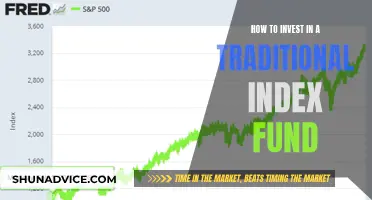
Index funds are a great way to build wealth over time, which is why they are popular with retirement investors. They are a group of stocks that mirror the performance of an existing stock market index, such as the S&P 500. Index funds are passively managed, meaning they don't require active decision-making on which investments to buy or sell. This passive management strategy makes them a low-cost investment option, as fees for actively managed investments are typically higher.
Index funds are also highly diversified, which reduces volatility and lowers risk. However, this diversification can limit the upside potential. While index funds have consistently outperformed other types of mutual funds over the long term, they are still vulnerable to market downturns.
So, should you invest in multiple index funds? There are a few things to consider. Firstly, funds that follow the same index will have very little variance in performance, so spreading your investments across different funds may not provide additional benefit. Secondly, investing in multiple index funds can be prudent if the underlying stocks differ, as this adds diversification to your portfolio.
Ultimately, the decision to invest in multiple index funds depends on your investment objectives, risk tolerance, and desired level of diversification.
What You'll Learn

Low fees and tax advantages
One of the biggest advantages of investing in index funds is their low fees. Index funds are passively managed, meaning they don't require a manager to actively trade or a research team to analyse securities and make recommendations. Instead, the fund's portfolio duplicates that of its designated index. This passive management style results in significantly lower management fees compared to other funds. For example, the Vanguard S&P 500 ETF has an expense ratio of just 0.03%.
Additionally, index funds have lower transaction costs as they hold investments until the index itself changes, which doesn't happen frequently. These lower costs can make a significant difference in your investment returns, especially over the long term.
Index funds also offer tax advantages. Firstly, they generate less taxable income compared to actively managed funds because they trade in and out of securities less frequently. Secondly, index funds can choose from hundreds or thousands of lots when selling a particular security, allowing them to sell the lots with the lowest capital gains and, therefore, the lowest tax liability. These tax advantages further enhance the returns on index funds.
When considering investing in index funds, it is important to compare their expense ratios, as some are cheaper than others. Additionally, it is worth noting that while index funds have lower fees than actively managed funds, they still incur some costs, such as investment minimums, account minimums, expense ratios, and tax-cost ratios.
Overall, the low fees and tax advantages of index funds make them an attractive investment option, particularly for those focused on long-term wealth accumulation.
Invest in SBI Pension Fund: A Guide to Retirement Planning
You may want to see also

Broad diversification
Index funds are a great way to build wealth over time, especially for retirement. They are a group of stocks that mirror the performance of an existing stock market index, such as the S&P 500. Index funds are passively managed, meaning they don't require active decision-making on which investments to buy or sell. This passive management strategy helps balance the risk in an investor's portfolio, as market swings tend to be less volatile across an index compared to individual stocks.
- Reduced risk: Diversification is a crucial aspect of risk management. By spreading your investments across multiple index funds, you reduce the impact of any single investment on your portfolio's performance. If one stock or sector underperforms, it will have a smaller effect on your overall returns.
- Enhanced returns: Broad diversification can also enhance your overall returns. By investing in multiple index funds, you increase your exposure to different areas of the market, allowing you to capture returns from various sectors and industries. This can lead to higher cumulative returns over time.
- Access to specific sectors and trends: Different index funds focus on specific sectors or trends, such as artificial intelligence, consumer goods, technology, or health-related businesses. By investing in multiple index funds, you can gain access to these specific areas of the market, allowing you to align your investments with your interests or expertise.
- Customized portfolio: Broad diversification allows you to customize your portfolio according to your investment goals and risk tolerance. You can adjust your allocation across different index funds to target specific sectors, regions, or market capitalizations. This flexibility enables you to design a portfolio that meets your unique needs and preferences.
- Long-term growth potential: Index funds are designed for long-term growth. Historical data shows that indexes tend to rise over time, and the S&P 500, for example, has posted an average annual return of nearly 10% since 1928. By investing in multiple index funds, you position yourself to capture the long-term growth potential of different sectors and markets.
In summary, broad diversification in index funds offers reduced risk, enhanced returns, access to specific sectors, portfolio customization, and long-term growth potential. It allows you to build a robust and tailored investment strategy that can help you achieve your financial goals.
Mutual Fund Shares: Smart Investment or Risky Business?
You may want to see also

Passive management
Index funds are a type of mutual fund or exchange-traded fund (ETF) that holds a basket of securities designed to mirror the composition of a specific market index. The goal of an index fund is to replicate the performance of the underlying index as closely as possible, and this is achieved through passive management.
With passive management, the fund manager does not actively select stocks or make frequent trades. Instead, the fund's portfolio is constructed to match the index, and it is only adjusted when the index itself changes, which is relatively infrequent. This passive approach leads to lower management fees and transaction costs, making index funds an attractive option for investors.
Over the long term, passive management has tended to outperform active management. According to legendary investor Warren Buffett, "huge institutional investors, viewed as a group, have long underperformed the unsophisticated index-fund investor who simply sits tight for decades." This is largely due to the lower fees associated with passive management.
While passive management offers broad diversification and low costs, it also has some limitations. One drawback is the lack of downside protection—if the market drops, the index fund will drop as well, as it is designed to mirror the index's performance. Additionally, passive management may not be able to take advantage of short-term market opportunities or trim underperforming investments.
In conclusion, passive management, as employed in index funds, offers a simple and cost-effective way to invest. By mirroring a market index, index funds provide broad diversification and have consistently delivered strong returns over time. However, they also have certain limitations, such as the inability to actively manage the portfolio to mitigate downside risks or exploit market opportunities.
Smart Mutual Fund Investing with 1 Lakh
You may want to see also

Long-term gains
Index funds are a great investment for building wealth over the long term. They are a group of stocks that mirror the performance of an existing stock market index, such as the Standard & Poor's 500 index. Index funds are considered a passive management strategy because they don't need to actively decide which investments to buy or sell. Here are some reasons why investing in multiple index funds can lead to long-term gains:
Diversification
Investing in multiple index funds means spreading your holdings across various industries, regions, or asset classes. This diversification helps to reduce the impact of negative performance in any single fund, keeping the overall volatility of your portfolio in check. By holding multiple funds, you're not putting all your eggs in one basket, reducing the risk associated with the short-term volatility of any particular fund.
Lower fees
Index funds have lower management fees than other funds because they are passively managed. Instead of having a manager actively trading, the index fund's portfolio just duplicates that of its designated index. Index funds also have lower transaction costs because they hold investments until the index itself changes, which doesn't happen very often. These lower costs can make a significant difference in your returns over time.
Tax advantages
Index funds generate less taxable income because they trade in and out of securities less frequently than actively managed funds. Additionally, by buying new lots of securities whenever investors put money into the fund, index funds can sell the lots with the lowest capital gains and, therefore, the lowest tax bite.
Long-term performance
Index funds have generally outperformed other types of mutual funds over the long term. The S&P 500, for example, has posted an average annual return of nearly 10% since 1928. While individual stocks may rise and fall, indexes tend to rise over time. With index funds, you won't get bull returns during a bear market, but you also won't lose cash in a single investment that sinks as the market turns skyward.
Customization
Investing in multiple index funds allows you to tailor your portfolio to your specific investment goals and risk tolerance. You can adjust your allocation based on changing market conditions or your long-term objectives. Additionally, you can choose from hundreds of indexes to track, including large U.S. stocks, small U.S. stocks, international stocks, and bonds.
Malaysia's Best Mutual Funds: Where to Invest?
You may want to see also

Minimal investment research
Index funds are a passive investment option that tracks a market index, such as the S&P 500 or the Nasdaq Composite. They are a popular choice for investors due to their low fees, tax advantages, and strong long-term performance relative to other types of funds.
When considering investing in multiple index funds, it's important to understand the benefits and drawbacks of this strategy. Here are some key points to consider regarding minimal investment research:
- Diversification: Index funds provide built-in diversification by holding a basket of stocks or other securities that mirror a specific market index. This diversification reduces the risk of suffering significant losses if a single company or sector underperforms. However, diversification also limits the upside potential, as the fund's performance is tied to the overall market or index it tracks.
- Low Fees: Index funds typically have lower management fees compared to actively managed funds because they passively follow an index. Lower fees can translate to higher returns over time, making them a cost-effective investment option.
- Tax Efficiency: Index funds tend to be more tax-efficient than actively managed funds because they generate less taxable income. They also have the flexibility to choose from various lots when selling securities, allowing them to minimize capital gains taxes.
- Performance Tracking: Index funds aim to match the performance of their underlying index. While this provides stability, it also means that there is no opportunity to outperform the market. If you're seeking to maximize returns and beat the market, index funds may not align with that goal.
- Limited Control: With index funds, you rely on the fund manager to mirror the performance of the chosen index. This passive approach means you have limited control over the specific investments held within the fund.
- Volatility: While diversification helps reduce risk, index funds can still experience volatility, especially during market downturns. If the index your fund tracks experiences a plunge, your index fund will also decline in value.
In conclusion, investing in multiple index funds can provide a simple and effective way to build wealth over time with minimal investment research. By diversifying across different indexes and taking advantage of low fees and tax efficiency, investors can potentially achieve strong long-term returns. However, it's important to remember that index funds are passive investments that mirror the market's performance, including both its highs and lows.
A Guide to Investing in Kenya's Money Market Funds
You may want to see also
Frequently asked questions
Investing in multiple index funds can help you build exposure in multiple markets simultaneously, without the hassle of analysing individual stocks. It also allows you to tailor your portfolio to your investment goals and risk tolerance.
The addition of too many funds can create an expensive index fund, with high expense ratios that impact overall investment returns. It's also important to be mindful of potential overlap and correlation between different index funds, which can reduce diversification.
The number of index funds you choose to invest in should be based on your investment objectives and personal preferences. If you're seeking a passive and low-cost investment strategy, multiple index funds can be a great option. However, if your goal is to generate market-beating returns, you may need to consider alternative strategies as index funds tend to produce average results.







